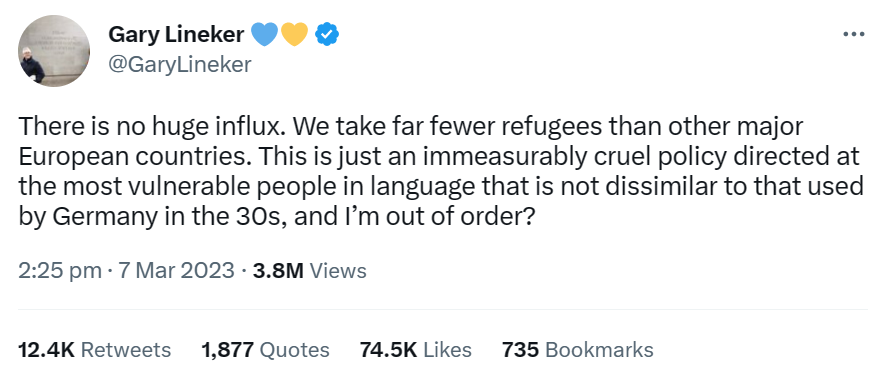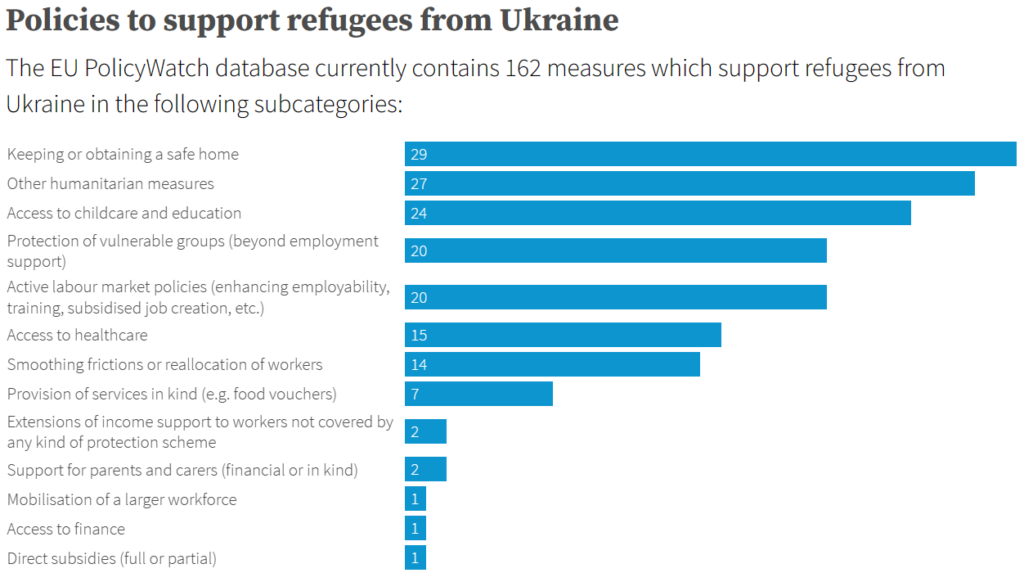What The Fact?
Gary Lineker attends the training session at Fulham Football Club where refugee children take part on March 5, 2020. Photo by Hammersmith & Fulham Council via Flickr (used under CC-BY-NC-ND-2.0)
Gary Lineker, former football player and broadcaster, claims that the British Government admits significantly fewer refugees than other major European countries, but is this true? Kai Evans reviews the evidence.
The Claim
The Twitter storm surrounding Gary Lineker and the BBC in recent weeks has been nothing short of extraordinary. In the media whirlwind that has followed, there has been heated, and indeed important, discussions around impartiality, media independence and in a broader sense, how this impacts on democracy. However, what has largely been forgotten is what Gary Lineker was actually banned for, and the vulnerable people he attempted to defend.
Ultimately, Lineker has been supporting asylum seekers seeking refuge in the United Kingdom. In particular, he has been critical of British Home Secretary Suella Braverman’s ‘Stop the Boats’ rhetoric and the British government policy to send asylum seekers arriving to the UK, to Rwanda.
In return, the Rwandan government has received £140m. The Refugee Council’s policy experts estimate that this plan, and the Illegal Migration Bill’s implementation as a whole, could cause 190,000 people fleeing war and persecution to be locked up or forced into destitution; 45,000 of these being children.
In Gary Lineker’s tweet, he claimed the following:
‘We [the United Kingdom] take far fewer refugees than other major European countries.‘
There is no doubt that in the last decade, there has been a significant increase in the amount of refugees in Europe. This is largely due to the Syrian Civil War, the migrant crisis in the Mediterranean and most recently, the Russian invasion of Ukraine. This situation has been coupled with the rise of anti-immigration and far-right sentiment across Europe, and subsequent policies by both the EU and national governments to either limit or support refugees.
So, is the claim by Gary Lineker accurate, and does the United Kingdom indeed take significantly less refugees than other European countries?
The Verdict

The claim is rated true and is accurate based on the best evidence publicly available at this time.

The Evidence
Looking to recent UN Refugee Agency figures in the map above, the darker blue the country, the more refugees per capita that country has. The paler the country, the less refugees per capita that country has taken in. Hover over any country in the map to see the per cent of the population that are refugees.
In reference to Gary Lineker’s claim, there are just six European countries (Albania, Belarus, Bosnia and Herzegovina, Hungary, Monaco, North Macedonia), out of 39 for which UN data is available, who host less refugees per capita than the United Kingdom, and almost all are considered some of the weakest economies on the continent. Monaco, the one country here with a very strong economy, has the fifth smallest population in the world, with just over 35,000 people calling Monaco home.
While what is considered a ‘major European country’ is subjective to say the least, it is fair to say that these countries are probably not what Lineker had in mind. If one is to consider a major European nation based on population size, Lineker’s claim also holds true. The ten largest European nations are the following, with the percentage of their population that are refugees in brackets:
- Turkey (4.3%)
- Germany (2.68%)
- United Kingdom (0.34%)
- France (0.95%)
- Italy (0.5%)
- Spain (0.55%)
- Poland (3.04%)
- The Netherlands (1.13%)
- Belgium (1.09%)
- Sweden (2.62%)
Clearly, the United Kingdom admits the least amount of refugees by a comfortable margin.
Another argument often heard is that the low number of refugees admitted to the UK is partially down to their geographical distance from the Middle East, North Africa and Ukraine, where the majority of refugees have fled from in recent times. However, this does not hold up, as other countries on the periphery of Europe have also accepted considerably more refugees per capita, such as Norway (1.17%), Ireland (1.03%) and even Iceland (0.88%).
What have European governments done to support Ukrainian refugees?
In addition to the unprecedented sanctions against Russia by both the European Union and national governments, much has been done to support Ukrainian refugees in the last year. Unfortunately, while certain countries such as Germany made gargantuan efforts to support refugees fleeing the Syrian Civil War and other conflicts in the Middle East throughout the 2010s, much of Europe did not offer the same solidarity then as seen in this wave of refugees arriving from Ukraine.
Regardless, the support shown to Ukrainian refugees across Europe since the Russian invasion has been unprecedented, resilient and admirable. As EU agency Eurofound notes:
‘A range of support measures have been initiated at EU level to help Member States meet the needs of refugees. The European Council has activated the first-ever Temporary Protection Directive, which includes special protection for children, access to education and healthcare, as well as access to jobs, accommodation and housing. In October 2022, the Council adopted conclusions on Ukraine/Russia, critical infrastructure, energy and economy and external relations.’
As the graphic below shows, the policies to support refugees from Ukraine have been varied and widespread. Currently, the EU PolicyWatch database has registered 162 measures by national governments in Europe. The most common of these include policies related to ‘keeping or obtaining a safe home’, ‘other humanitarian measures’ and ‘access to childcare and education’.

Replies from the British Government
The British Government have defended their plan to send refugees and asylum seekers to Rwanda as this will deter people coming to the UK through ‘illegal, dangerous or unnecessary methods’, such as on small boats. However, since this plan was announced in April 2022, the number of boat crossings have not reduced.
Suella Braverman has also noted the British Government’s generosity and support of ‘hundreds of thousands of people’ from Ukraine, Afghanistan and Hong Kong in recent years. This sentiment is echoed, and expanded upon in more detail, in official government documents such as this Home Office factsheet published in April 2022.
Conclusion
Given the evidence outlined throughout this article, Gary Lineker’s claim is true, regardless of how you define ‘major European country’. It is imperative that, in times of crisis and turmoil, Europe, and indeed the world, stands together to protect and support the most vulnerable members of the global community, such as refugees and asylum seekers. The United Kingdom however, appear to be dragging their heels in this regard.
Verdict
Based on the What The Fact? scales guide, the claim is rated as True – the claim is accurate based on the best evidence publicly available at this time.
- Kai Evans is a masters graduate in International Development, and a contributing writer with developmenteducation.ie
developmenteducation.ie’s What The Fact? supports the code of principles of the International Fact Checking Network. We check claims by influencers, from local to national to transnational that relate to human rights and international human development.
Transparent fact checking is a powerful instrument of accountability, and we need your help. Send tips and ideas to facts@developmenteducation.ie
Join the conversation #whatDEfact on Twitter @DevEdIreland and Facebook @DevEdIreland
More on developmenteducation.ie

Was Gary Lineker right about the British government’s refugee admissions?
What The Fact? Gary Lineker attends the training session at Fulham Football Club where refugee children take part on March 5, 2020. Photo by Hammersmith

Let’s learn about global justice but make it fun! 10 games to include in your development education practice
A round up of my favourite 10 games to include in your global citizenship education practice, by Niffy Olamiju

Supporting the Integration of the Resettled (STIRE)
As part of IDEA’s Annual Conference 2021, Maria Gonzalez, Development Perspectives, presenting their STIRE Project in order to Showcase the initiatives and approaches addressing inequality

We Are All Human
We Are All Human is an outward looking, compassionate approach to the refugee crisis, created by a group of students in Largy College, Clones. It is an immense effort to create a safe and inclusive space in their community for their new Syrian neighbours.

Is Malta Viable? A youth-led editorial project
SKOP, the Maltese Development NGO Platform worked with a group of young people from across the Mediterranean to highlight the role of young people in

Are the majority of people in Ireland “worried that people are coming into Ireland illegally, staying here and freeloading off the state?”
53% of respondents agreed with the statement, on average. But was this an objective statement to include in the survey?
